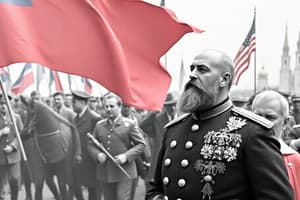Podcast
Questions and Answers
What were the problems existing in Russia in 1917?
What were the problems existing in Russia in 1917?
War caused great unrest and a large death toll. Famine was an issue on the homefront. The Russian government was disciplining deserters with torture and death. Soldiers were losing morale. Enemy forces were looming ready to invade Russia. Families were suffering.
Where and when did the Russian Revolution take place?
Where and when did the Russian Revolution take place?
February (March) and October (November) 1917 in Russia.
What caused the Russian Revolution?
What caused the Russian Revolution?
Discontent over corrupt and ineffective government, widespread poverty, scarcity of food, and massive WWI losses.
What were the effects of the Russian Revolution?
What were the effects of the Russian Revolution?
How long was the peasants' work day?
How long was the peasants' work day?
How did the working conditions add to the peasant unrest before the Russian Revolution?
How did the working conditions add to the peasant unrest before the Russian Revolution?
What types of poor working conditions inspired the industry workers to approach the Winter Palace on January 22, 1905?
What types of poor working conditions inspired the industry workers to approach the Winter Palace on January 22, 1905?
What were the workers' demands at the Winter Palace on January 22, 1905?
What were the workers' demands at the Winter Palace on January 22, 1905?
What ended up happening to the workers at the Czar's Winter Palace in 1905?
What ended up happening to the workers at the Czar's Winter Palace in 1905?
Rasputin had influence over government decisions when he was close to the Czar's family. How does this support the claim that the government was corrupt?
Rasputin had influence over government decisions when he was close to the Czar's family. How does this support the claim that the government was corrupt?
What effects did the outcome of the Russo-Japanese War have on the Russian people?
What effects did the outcome of the Russo-Japanese War have on the Russian people?
Why were Russian people unhappy with their country's involvement in WWI?
Why were Russian people unhappy with their country's involvement in WWI?
What spurred the March Revolution in 1917?
What spurred the March Revolution in 1917?
How successful was the provisional government set up by the Duma?
How successful was the provisional government set up by the Duma?
List four reasons why life was difficult for workers in Russia in the early 1900s.
List four reasons why life was difficult for workers in Russia in the early 1900s.
What factors contributed to workers supporting Bolshevik ideology?
What factors contributed to workers supporting Bolshevik ideology?
Flashcards are hidden until you start studying
Study Notes
Causes of the Russian Revolution
- The Russian homefront suffered from famine, unrest, high death tolls, and low soldier morale during World War I.
- The brutal response of the government towards deserters included torture and execution.
- Discontent stemmed from corruption, ineffectiveness of the government, widespread poverty, and food scarcity, alongside massive losses in WWI.
Timeline of Events
- The Russian Revolution occurred in February (March) and October (November) of 1917.
Key Influences on the Revolution
- Czar Nicholas II abdicated in favor of the Duma as the authority was challenged.
- The Bolsheviks, led by Vladimir Lenin, capitalized on the unrest, negotiating peace with Germany, which resulted in Russia becoming the first communist nation, renamed the USSR.
Working Conditions and Labor Strikes
- Peasants endured long workdays: 11 hours in factories and 16 hours on farms.
- Harsh working conditions included long hours, poor treatment, and inadequate food, causing dissatisfaction among workers who compared their plight to the upper class's comfortable lifestyles.
1905 Events Leading to Revolution
- The 1905 protests were sparked by long hours, health concerns, wage declines, layoffs, and factory owners' resistance to trade unions.
- Workers demanded an eight-hour workday, higher wages, and improved working conditions during the protest at the Winter Palace on January 22, 1905.
Bloody Sunday Incident
- The procession at the Winter Palace was violently suppressed by police and Cossacks, resulting in over 100 deaths and around 300 injuries, known as Bloody Sunday.
Influence of Rasputin
- Rasputin, a controversial figure, manipulated the Czar's family and influenced government decisions, highlighting the corruption within the Russian leadership.
Impact of the Russo-Japanese War
- The disastrous defeat in the Russo-Japanese War fueled public discontent and diminished faith in the Czar, exacerbating unrest among peasants and workers.
- Russia's lack of preparedness for WWI, illustrated by poor military leadership and equipment, compounded public dissatisfaction, leading to calls for change.
The March Revolution
- The March Revolution in 1917 was triggered by citywide strikes led by women textile workers protesting bread and fuel shortages, which escalated into broader worker and soldier revolts.
Provisional Government's Limitations
- The provisional government established by the Duma was weak and failed to enact significant reforms or meet the demands of the peasants, leading to a loss of influence to local councils known as soviets.
Workers' Hardships
- Workers faced grueling conditions, meager wages, outlawed unions, and a stark wealth gap, significantly lowering their standard of living.
Support for Bolsheviks
- Workers and peasants were drawn to Bolshevik ideology, which promised equality and was driven by a dedicated, radical group led by Lenin, who inspired commitment to revolutionary change.
Studying That Suits You
Use AI to generate personalized quizzes and flashcards to suit your learning preferences.




